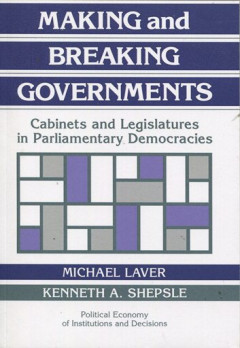Ditapis dengan
Ditemukan 2 dari pencarian Anda melalui kata kunci: author="Michael Laver"

Cabinet ministers and parliamentary government
- Edisi
- -
- ISBN/ISSN
- 9780521432467
- Deskripsi Fisik
- 318 hlm.; illus : 22.5 cm
- Judul Seri
- -
- No. Panggil
- -
- Edisi
- -
- ISBN/ISSN
- 9780521432467
- Deskripsi Fisik
- 318 hlm.; illus : 22.5 cm
- Judul Seri
- -
- No. Panggil
- -

Making and Breaking Governments: Cabinets and Legislatures in Parliamentary D…
Making and breaking goverments offers a theorical argument about how parliamentary democracy works. The heart of a parliamentary regime is the process by which the elected representatives choose a goverment, consisting of a cabinet and ministers, to serve as the executive arm of the regime. Strategic interaction among parliamentary parties creates new governments and either maintains them in of…
- Edisi
- -
- ISBN/ISSN
- 0521438365
- Deskripsi Fisik
- xi,301 hal. ; 24 cm.
- Judul Seri
- -
- No. Panggil
- 321.804 3 LAV m
 Karya Umum
Karya Umum  Filsafat
Filsafat  Agama
Agama  Ilmu-ilmu Sosial
Ilmu-ilmu Sosial  Bahasa
Bahasa  Ilmu-ilmu Murni
Ilmu-ilmu Murni  Ilmu-ilmu Terapan
Ilmu-ilmu Terapan  Kesenian, Hiburan, dan Olahraga
Kesenian, Hiburan, dan Olahraga  Kesusastraan
Kesusastraan  Geografi dan Sejarah
Geografi dan Sejarah